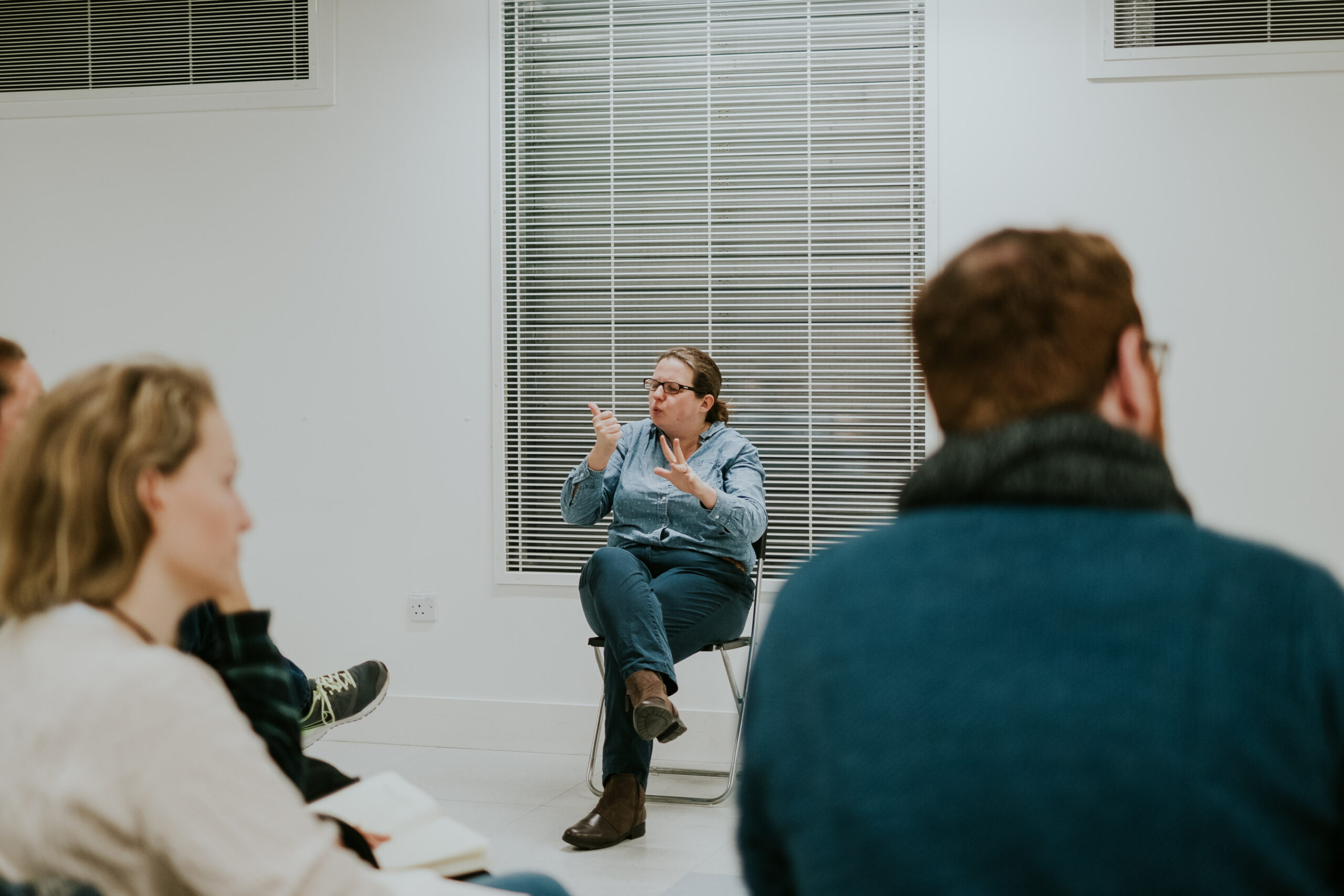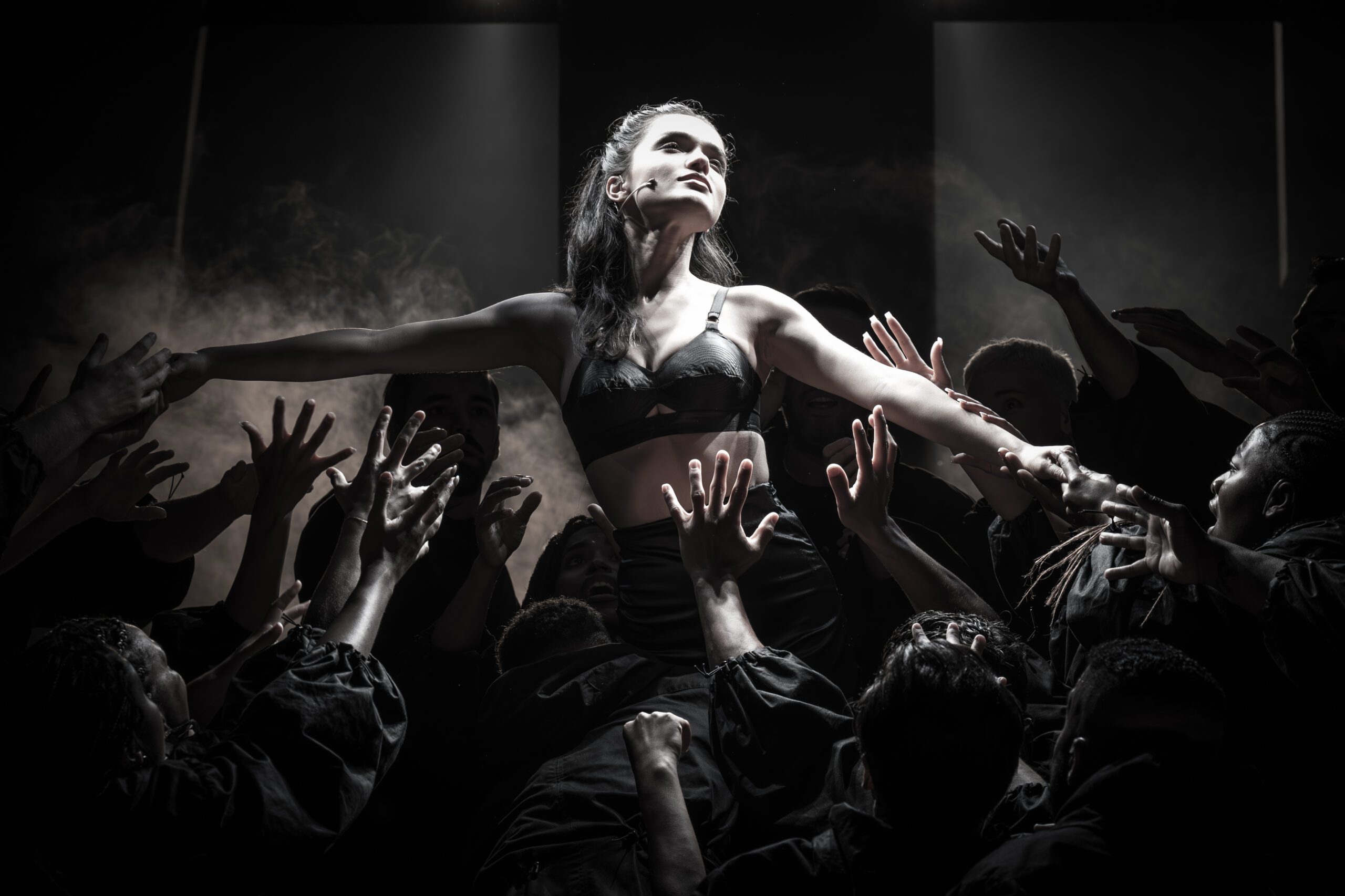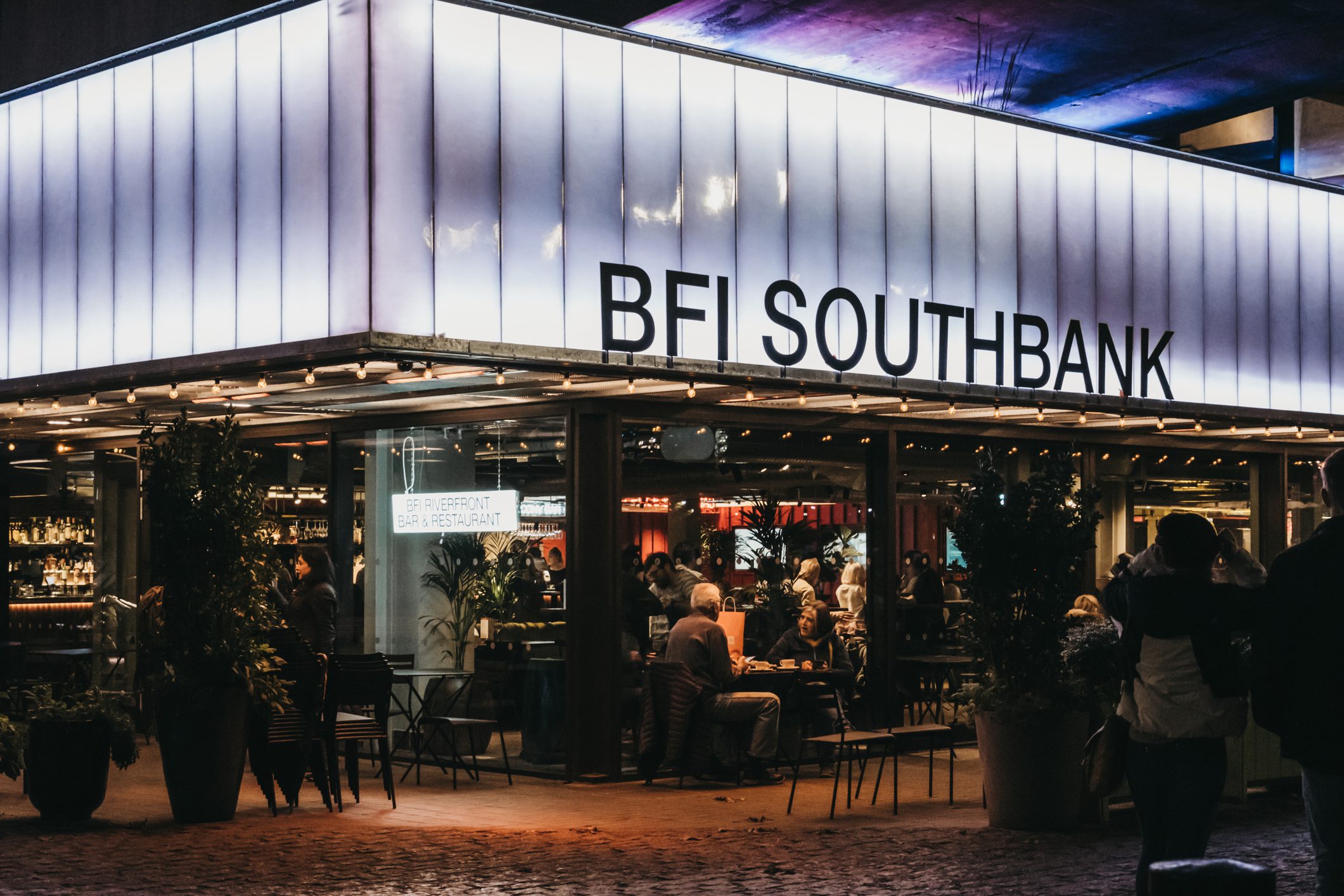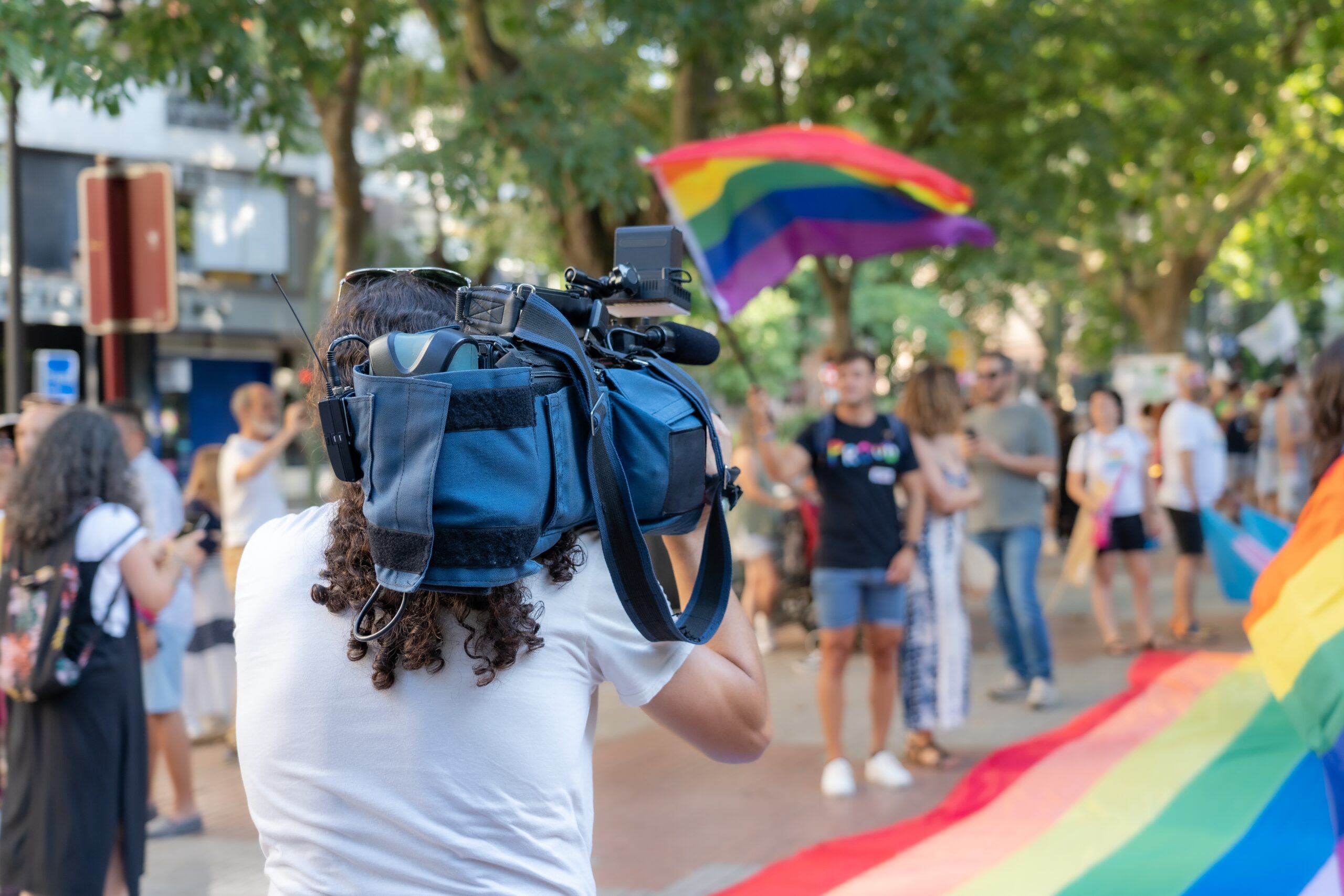Demystifying the role of a British Sign Language Consultant and how they support the creative process of performances that involve deaf characters or sign language.
Having a BSL consultant on your production will truly make a positive change to the attitudes towards deaf people by including BSL and deaf characters authentically
Since the launch of the Guide to Good Practice with BSL in the Arts, there have been a few mentions about British Sign Language (BSL) Consultants but very little is known about what we do and how we can help the creative process, that’s where this article comes in…
What is a BSL Consultant?
BSL consultants are people born deaf or who became deaf at a young age, their first language is BSL or they’re fluent and have a clear sense and understanding of deaf culture and identity. We have experience of working in the creative industry as actors or producers and are an essential part of the creative team. We can provide support to the director if sign language is featured in a production, working with them to explore various creative sign elements, instead of conventional BSL, whilst at the same time enabling deaf audiences to access and understand the play or film.
In some cases, BSL consultants work with deaf actors to get them to understand what the director wants them to do. There have been situations where deaf actors did not understand what was required of them despite having BSL interpreters in the room to facilitate communication. Sometimes using another deaf person with cultural understanding is better than a BSL interpreter, which is where we can help.
The BSL Consultant’s Main Roles
- Supporting the casting process when auditioning actors to find those with the right BSL skills to fit the character
- To support anyone using sign language on stage or screen – similar to a voice coach but for BSL
- Supporting the director to incorporate BSL in their productions and finding the optimal BSL translation for lines
- Ensuring that deaf culture is authentically incorporated where appropriate
- Ensuring framing and sightlines of signing on stage or film are clear and comprehensible to audiences and deaf people in particular.
BSL consultants can also be referred to as BSL Monitors (usually within TV and Media context), BSL Coaches or Director for Artistic/Creative Sign Language. Under those headings, there are also many BSL consultants with expertise in certain genres, such as Visual Vernacular (VV), Shakespeare, musicals/sign songs, dance, urban signs, storytelling, poetic signs, country or location-specific signs i.e. Sri Lankan signs and historical/period-appropriate sign language. If a play has many elements e.g. is set in a certain period and wants to incorporate VV, then the director of artistic sign language can suggest bringing in few other experts in like a VV expert or sign linguistics expert.
How BSL Consultants Work Differently in TV and Theatre
The BSL consultant’s approach to working in TV and theatre is very different.
Working on TV productions differs as there’s often no, or limited, rehearsal time so it’s imperative to find time for the BSL consultant to work with the actors to go through their translation. The consultant should be there for every shoot whenever signing or deaf actors are being filmed.
Usually working within the TV context means we cannot make the signs more creative on-screen as our role is to make sure the language is authentic, it needs to look like every day signing so that conversations are believable. This is very different from stage, where we can make the signs creative and attractive to make the language artier but with an authentic feel to it.
The BSL consultant’s involvement within the theatre process can vary. They can be there on a weekly basis or every day throughout the whole rehearsal if they also have another role within the creative team i.e. as an assistant director.
Casting an actor who can sign proficiently or fluently can save a lot of unnecessary stress and more focus can be spent on allowing actors to be more creative with the language they already know.
How BSL Consultants Help the Audition Process
Very rarely will there be people on the audition panel that have any understanding of sign language and most won’t be able to tell whether the actors are native signers or fluent in the language regardless if they are deaf or hearing. Sometimes the ability of the person may not match what’s on their CV, so having a BSL consultant to vet this is useful. We’ll also be able to tell if the actor has the dexterity to make the signing look natural and whether they can work alongside a consultant to develop a translation.
Casting an actor who can sign proficiently or fluently can save a lot of unnecessary stress and more focus can be spent on allowing actors to be more creative with the language they already know. They’ll be able to develop their characters and explore exciting possibilities of bringing new sign elements so the deaf audiences truly can follow everything with minimal effort.
The Translation Process and Consulting Sessions
BSL is a visual language that has its own grammar and syntax, which is completely different from English. The translation process can be challenging, time-consuming and stressful for actors when all their lines have to be translated from English to BSL.
It’s not realistic to expect an actor to just ‘learn sign’, any more than someone could become fluent in French or Spanish within the same time frame, but going on a BSL course before the rehearsals or filming starts would really help the process.
There aren’t signs for every word in the English language so consulting sessions are useful as it’s where conversations can be had, and certain signs can be agreed. Other discussion points such as sign accents, regional variations and generational signs that make their characters as authentic as possible can also be discussed. Naturally, things change during rehearsals but at least the large bulk of the work has been done beforehand so the actors can focus on other areas. It’s such a huge onus on the actor to do this themselves so assistance from a BSL consultant is useful.
It’s advisable to have a separate translation period before the start of rehearsals with the BSL consultant and relevant cast and creative members as there would be discussions that may come up that are not applicable to other cast members. It would also prevent divisions within the company if you take people away to work on the BSL.
The BSL consultant would work with actors, in particular hearing actors, to make their characters believable e.g. where they would choose to use a combination of BSL and natural gestures to get the message across to the deaf characters and making sure they are face-to-face with them when communicating.
In a recent piece of work, a deaf child character was communicating with their hearing parents using home/cultural signs, the BSL consultant worked with the actors to make sure these signs truly reflect the communication of some parts of the deaf community who have grown up with hearing parents. In some cases, colloquial gestures would be added to enable the deaf audience to feel the cultural vibe e.g. Indian or Black gestures depending on the play setting itself.
Another thing we can do is support BSL interpreters in their preparation for BSL interpreted shows. Often interpreters translate a whole show on their own but working with a BSL consultant means we can support them with their translation choices and clarity.
In TV and film, BSL monitors can assist when there may be framing, sign continuity and consistency issues or can help with deaf cultural nuances that can get lost.
How BSL Consultants Help with Clarity, Sightlines, Authenticity and Framing
BSL consultants can check if the signing is clear and comprehensible for deaf viewers wherever they are sat. For example, if it’s a theatre in the round or multiple actors are signing, then the consultant can suggest some creative solutions to enable the audience to have access without the deaf actors feeling conflicted, i.e. so they don’t feel like they are interpreting but rather are having a parallel conversation topic that enables deaf audiences to truly engage with the play.
In TV and film, BSL monitors can assist when there may be framing, sign continuity and consistency issues or can help with deaf cultural nuances that can get lost. We can be there to remind people of this and advise how to ensure the sign language is visible or to ensure it makes sense when the hands may not be in frame.
Top Tips
- Bring in a BSL consultant at the planning stage as they can help provide:
- the right support for the creative team
- access for the deaf actors
- assist with getting the budgeting correct at the start to account for everything including the cost of hiring a BSL consultant etc.
- When starting out on a new production, it’s always useful to have a deaf awareness session on the very first day to explain the BSL consultant’s role. This will help everyone get to know who to ask about sign language and can help people have a better understanding of deaf culture, how to get a deaf person’s attention and create a more inclusive and supportive environment
- Make sure the BSL consultant is the right person for the job. Check their skill set and double-check with the deaf actor(s)
- Bring in the BSL Consultant as early as possible, e.g. at the story development stage, and include them as much as possible throughout the creative process. They can advise on the genuine portrayal of the characters and bring deaf features into the script like shoulder tapping to get attention, look behind, different flashing lights or alerting devices methods for different situations, whether the character would typically wear hearing aids or cochlear implants etc.
- Try to avoid having too many voices in the room and instead ensure your BSL consultant is the main point of call
- Access to Work can cover the cost of BSL consultants for deaf actors as part of their access support during the rehearsals which means it won’t affect the production budget
- Have fun experimenting with sign language with the support of the BSL Consultant.
Having a BSL consultant on your production will truly make a positive change to the attitudes towards deaf people by including BSL and deaf characters authentically without appearing tokenistic with a new dimension can really lift the production /storylines. Deaf audiences will feel truly represented on stage and on screen in the right way, as they have been oppressed or poorly portrayed for so long.
If you’re interested in working with a BSL consultant, you can find a list of contacts at Deaf Talent Collective.
Huge thanks to Alim Jayda, Fifi Garfield and Julian Peedle-Calloo for their support in this article.
 Deepa Shastri has worked in the arts and cultural sector on various levels for the last 15 years as an actress, BSL consultant and project manager. Recently she worked as an Associate Producer for The Process at Bunker Theatre. She’s an expert on deaf and hard of hearing audience development and has specialist knowledge in theatre access solutions such as BSL interpretation/translation and captioning.
Deepa Shastri has worked in the arts and cultural sector on various levels for the last 15 years as an actress, BSL consultant and project manager. Recently she worked as an Associate Producer for The Process at Bunker Theatre. She’s an expert on deaf and hard of hearing audience development and has specialist knowledge in theatre access solutions such as BSL interpretation/translation and captioning.
As a BSL Consultant, credits include: ‘Crooked Dances’ and ‘King John’ at RSC, ‘ear for eye’ (Royal Court Theatre), ‘The Meeting’ (Chichester Festival Theatre), ‘A Christmas Carol’ (Bristol Old Vic), ‘Puzzle Creatures’ (The Place) and ‘Not I’ (Battersea Arts Centre with Touretteshero).
As an actress, she has worked on numerous deaf short films as well as on stage – ‘Frozen’ (Birmingham REP with Fingersmiths). She signed a song solo at the Paralympics Opening Ceremony for London 2012.
Headshot credit: Johnathan Neal



















